Malaysia has taken a major step towards renewable energy with its newly announced rooftop solar leasing scheme. This initiative enables homeowners to lease their rooftops for solar energy production, helping to lower electricity bills while contributing to sustainability goals.
The program primarily targets B40 and M40 households, making solar power accessible without high upfront costs. However, industry experts emphasize that clearer guidelines and public awareness campaigns are crucial to ensuring its success.

How Does the Rooftop Solar Leasing Scheme Work?
The Community Renewable Energy Aggregation Mechanism is designed to let homeowners lease their rooftops to third-party aggregators, who will then sell the generated solar power to local consumers.
This model allows:
- Homeowners to earn passive income without investing in solar panel installation.
- Energy companies to aggregate multiple rooftops, increasing solar energy production.
- Consumers to access clean, renewable electricity at competitive rates.
Meanwhile, the Corporate Renewable Energy Supply Scheme, launched in 2024, enables businesses to buy solar power directly from independent producers. This allows corporations to meet sustainability goals while benefiting from lower energy costs.
What Are the Key Benefits of the Scheme?
Malaysia’s solar leasing initiative has the potential to transform the energy landscape.
1. Lower Electricity Bills
Many households struggle with rising electricity costs. This initiative allows homeowners to generate passive income by leasing their rooftops, offsetting their energy expenses.
2. Increased Property Value
Homes equipped with solar panels are seen as valuable investment assets. This scheme makes properties more attractive to buyers and tenants.
3. Environmental Impact
Encouraging solar power adoption helps Malaysia move toward its renewable energy targets by reducing carbon emissions and decreasing dependence on fossil fuels.
4. Inclusivity in Renewable Energy
The scheme removes financial barriers, making solar energy accessible even for lower-income households that may not have been able to afford installation costs.
5. Potential Expansion to Religious & Community Buildings
Experts suggest extending the program to mosques, temples, churches, and community centers, maximizing available roof space for green energy production.
What Challenges Need to Be Addressed?
While the solar leasing scheme presents tremendous potential, industry leaders point out several concerns that must be addressed to ensure its long-term success.
| Challenge | Proposed Solution |
|---|---|
| Lack of Public Awareness | Launch nationwide education campaigns to inform homeowners. |
| Unclear Regulatory Framework | Government must establish clear legal guidelines for solar leasing. |
| Insurance & Liability Concerns | Define responsibilities for maintenance, damages, and contract terms. |
| Limited Participation in Rural Areas | Expand outreach to semi-rural and rural communities. |
| Need for Financial Incentives | Introduce tax breaks, subsidies, and electricity bill rebates for participants. |
According to Gading Kencana Sdn Bhd’s Managing Director, Datuk Muhamad Guntor Mansor Tobeng, the government needs to streamline the process to make participation easier.
What Are Industry Experts Saying?
Several key players in Malaysia’s energy sector have expressed strong support for the initiative but emphasize the need for further clarity.
Lionel Yap (Malaysian Photovoltaic Industry Association)
“The scheme is a great step forward, but regulatory and commercial aspects need clearer definitions. Questions around liability, contract length, and insurance must be answered to build confidence.”
Dr. Saravanan Thambirajah (Federation of Malaysian Consumers Associations)
“This program enables lower-income households to earn without upfront costs, but continuous education is crucial. Many consumers are still unaware of such opportunities.”
Muhamad Guntor Mansor Tobeng (Gading Kencana Sdn Bhd)
“The government should expand this initiative to include religious buildings and community centers, maximizing solar potential.”
These experts agree that ongoing government engagement and industry collaboration will determine how well the scheme performs in the long run.
What Needs to Happen Next?
For Malaysia’s rooftop solar plan to reach its full potential, experts suggest the government should:
- Develop clear regulatory guidelines to ensure smooth implementation.
- Launch nationwide education campaigns to inform homeowners about the scheme’s benefits.
- Offer financial incentives such as tax breaks or rebates to encourage participation.
- Expand the program to include community and religious buildings.
- Address insurance and liability concerns to build public trust.
With the right policies and public support, Malaysia could become a leader in solar energy adoption, setting an example for other nations transitioning to sustainable energy solutions.
Frequently Asked Questions
How does the rooftop solar leasing scheme work?
Homeowners lease their rooftops to energy companies that install solar panels and sell the power generated. Homeowners receive passive income while contributing to renewable energy production.
Who is eligible to participate?
The scheme is open to homeowners across Malaysia, particularly those in B40 and M40 income groups. The government may later expand the program to businesses and community buildings.
Will homeowners need to invest in solar panel installation?
No, the scheme removes upfront costs—third-party providers handle installation, maintenance, and power distribution.
What are the financial benefits for homeowners?
Participants earn rental income by leasing their rooftops, helping to reduce electricity costs without needing direct investment.
Are there any risks involved in leasing rooftops for solar energy?
Some concerns include maintenance, insurance, and contract terms. The government is working to establish clear policies to address these issues.
Can rural homeowners benefit from the program?
Yes. While initial adoption may focus on urban areas, rural communities could greatly benefit if awareness and accessibility improve.
Is this initiative part of Malaysia’s broader renewable energy strategy?
Yes. Malaysia aims to increase solar energy adoption to reduce carbon emissions and move toward a greener future.
Conclusion
Malaysia’s rooftop solar leasing scheme is a game-changing initiative that makes renewable energy accessible to homeowners without upfront costs. While challenges remain, clear regulations, financial incentives, and strong public awareness will be key to its success.
If implemented effectively, this initiative could redefine Malaysia’s energy landscape, benefiting households, businesses, and the environment.
Click here to know more.
Aanchal is a passionate writer with a keen interest in storytelling, content creation, and creative expression. She enjoys exploring diverse topics and crafting engaging narratives that captivate readers.
